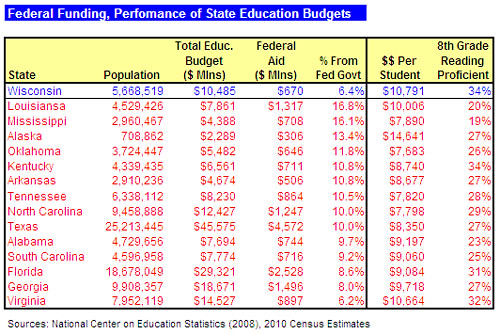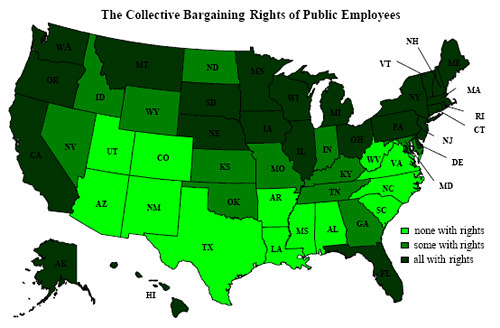Just days after his sneering "so be it" at the prospect of massive job losses which could result from GOP budget policies, House Speaker John Boehner declared public employees have a "machine gun" pointed "at the heads of local officials." That makes Boehner just the latest Republican leader respond to a $175 billion shortfall in state budgets that could trigger up to 900,000 layoffs by calling for an end to collective bargain rights for government workers they slander as "overpaid", "freeloaders" and a "new privileged class in America."
But in their all-out war to crush union - and Democratic - power, Republicans are pushing the states into a headlong race to the bottom. Because as the numbers show, incomes, working conditions and educational performance are worst where union protections are weakest and Republicans poll best.
To make their case during the current stand-off in Madison, conservatives have taken aim at Wisconsin's teachers. Unfortunately for their GOP echo chamber, the right-wing blogosphere made the mistake of complaining that Wisconsin received millions of dollars in federal education aid when solidly Republican red states get much, much more. Then, the would-be Republican union busters are whining that Badger state students can't read. As it turns out, Wisconsin students outperform their counterparts in those reddest of states where collective bargaining rights are few - or non-existent.
Sadly for the right-wing commentariat, the data show that Wisconsin schoolchildren out-read the kids in states where Republicans do best and where the federal government most heavily subsidizes the local education systems. Even more telling, those know-nothing red states also happen to be public workers have the fewest collective bargaining rights.
As the New York Times detailed just days ago, state workers without a college degree generally make more than their private sector counterparts ($34,000 versus $32,000, or a 6.3% gap), while college graduates make much less (a -19.9% gap). But in the reddest of states (see map at top), public employees experience a pay deficit regardless of education level.
If that geography looks familiar, it should. It not only looks like recent American electoral maps, but the atlas of union-busting as well. Within the borders of the so-called "Right to Work" states (which prohibit workers from being required to join a trade union as a condition of employment), private sector and public sector employees alike find unfriendly faces in power:
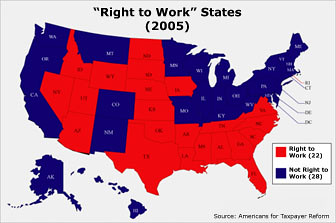
Just how unfriendly was documented five years ago by the Political Economy Research Institute at the University of Massachusetts. The report, titled "Decent Work in America: The State-by State Work Environment Index 2005", offers an assessment of the best work environments in the United States. The top five states were Delaware, New Hampshire, Minnesota, Vermont and Iowa, the bottom five were South Carolina, Utah, Arkansas Texas and Louisiana. (For the full data tables, analysis and methodology, see the report's technical background paper.)
As a rule of thumb, if your state voted for John McCain in 2008, workers there don't have it very good. All of the top 5 states voted for Barack for President; all 10 bottom dwellers are residents of George W. Bush's Red America.
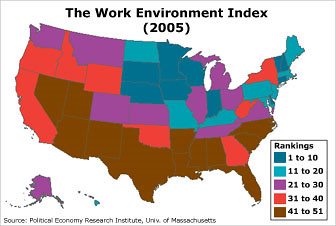
The Work Environment Index (WEI) rates the quality of Americans' working lives by a weighting of three factors: job opportunities, job quality, and job fairness. Job Opportunities includes the statewide unemployment rates, the duration of unemployment, and the percentage of "involuntary" part-timers. Job Quality refers to average wages (importantly, adjusted for the cost of living) and the proportion of workers receiving health and pension benefits. Job Fairness measures each state's percentage of low-wage workers (an indicator of income inequality), pay differential between men and women, minimum wage levels, collective bargaining rules and importantly, whether it is a "right to work" state.
There are no surprises among the worst performing states in the Work Environment Index. Virtually all below the Mason-Dixon Line, the WEI laggards feature dismal pay and an outwardly hostile environment towards union organizing, workers' rights and collective bargaining. Red America is the home of the Right-to-Work (RTW) states. A leader in the Right-to-Work movement, Bush's home state of Texas was ranked 50th, with the percentage of workers with health and pension benefits running a full 10% below the top WEI performers.
Since the WEI was published in 2005, the data on living standards in union-bashing Republican strongholds hasn't gotten any prettier. The Census Bureau's 2011 Statistical Abstract (which is based on 2008 data), shows per capita income and median household income is worst where GOP's laissez-faire crowd finds its strongest support. And if poverty is at its highest, as Speaker Boehner might say, then so be it.
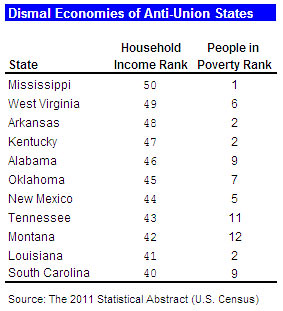
Now, it is true that the cost of living in the right-to-work states is generally lower. And as Politifact explained, in recent years incomes in RTW states have performed better than in free-bargaining states. (Sadly, average household income began declining in the U.S. even before the onset of the Bush recession; an AFL-CIO analysis showed that between 2000 and 2009, median income dropped 3% in TRY states compared to 5% elsewhere.) But as Russell Kashian of the University of Wisconsin-Whitewater explained, given the small and declining unionized workforce in the United States:
Any right-to-work effect on income growth likely is diminishing, he said. Employers seeking low wages are more likely to go overseas, rather than choosing a right-to-work state over a free-bargaining state in the U.S.
As for right-to-work poster child Texas, the Lone Star State economic miracle never happened. As Paul Krugman explained, over the past decade, the unemployment rate in Texas (where less than 20% of public workers are covered by union contracts) has been little different from New York (where the figure is 75%). Rick Perry nevertheless finds himself with a $25 billion budget hole. As for Texas' rapid population growth, "its liberal land-use and zoning policies have kept housing cheap." Meanwhile, his health care system ranks 46th nationwide and dead last for the percentage of residents with insurance.
Still, Republicans seek to level the economic playing field by lowering the floor for everyone. Americans wondering what will happen in Wisconsin if Governor Scott Walker succeeds should look not to high-performing states like Connecticut, Massachusetts and New Hampshire, but, say, Alabama. There, workers have no collective bargaining rights in the public or private sector. Dismal, under-funded schools are bankrolled with federal dollars from blue-state taxpayers. And low-incomes and high-poverty are the rule, not the exception. And still, as the New York Times detailed, the small town of Prichard stopped paying its retirees' pensions.
As Jonathan Cohn summed up the Republican race to the bottom:
"But ask yourself the same question you should have been asking then: To what extent is the problem that the retirement benefits for unionized public sector workers have become too generous? And to what extent is the problem that retirement benefits for everybody else have become too stingy?
I would suggest it's more the latter than the former."
Republicans have seen the future, and it's in Alabama. And if jobs, health care coverage and retirement benefits have to be slashed to get there, well, so be it.
(This piece also appears at Perrspectives.)






